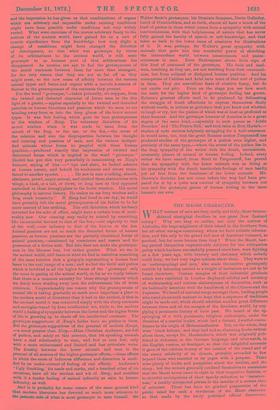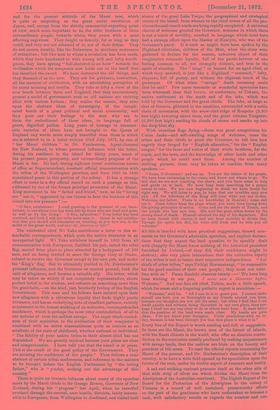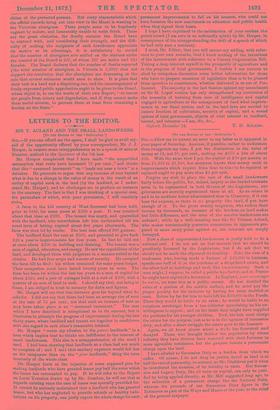THE MAORI CHARAC TER.
WHAT manner of men are they, really and truly, those bronze- skinned aboriginal dwellers in our great New Zealand colony ? Why are they so unlike, not only the natives of Australia, the huge neighbour of their island in the Southern Seas, but all other savages concerning whom we have reliable informa- tion, and like only to the grand red men of American romance, as poetical, but far more human than they ? When the Maori, hav- ing proved themselves impracticable subjects for the extirpation policy which has been successfully pursued elsewhere, were fighting us a few years ago, with bravery and obstinacy which nobody could deny, we had very vague notions about them. They were to us ' anthropophagi and men,' who made themselves grotesquely terrible by tattooing carried to a height of barbarous art not to be found elsewhere. Certain samples of their industrial products which were exhibited in London displayed solidity and accuracy of workmanship and curious elaborateness of decoration, such as we habitually associate with the handiwork of the Chinese and the Japanese. We heard of national songs amongst them, leading people who cared about such matters to hope that a sequence of traditions might be made out, which should establish another great difference between them and all the savages of the Southern world, by sup- plying a proximate history of their past. We heard of the up- springing of a wild, passionate, religious enthusiasm, under the direction of a martial leader, which had a distant, dwarfed resem- blance to the origin of Mohammedanism. But, on the whole, they were black fellows,' and they had had no charming books written about them, except Dr. Hochetetter's, which was originally pub- lished at Arkansas, in the German language, and afterwards, in the English version, at Stuttgart, so that the delightful accounts it gave of the sublime beauty of the interior of the island and of the sunny salubrity of its climate, probably extended to few beyond those who resorted to its pages with a purpose. There were plenty of books and pamphlets about the settlers, and the sheep ; but the writers generally confined themselves to assurances that the Maori never camp in sight in their respective districts, or to cheerful anticipations of their speedy reduction to " harmless- ness," a readily interpreted phrase in the mouths of a certain class of colonists. There has been no gradual preparation of the public mind for such a revelation of the Maori character as that made by the lately published official documents,
and for the present attitude of the Maori race, which is quite as surprising as the great social revolution of Japan, and, except from the strictly commercial-exporting point of view, much more important to us, the elder brethren of these extraordinary people, towards whom they yearn with a most affecting eagerness. They fought us bravely, for as long as they could, and they are not ashamed of it, nor of their defeat. They do not mourn dumbly, like the Delawares, in stubborn endurance of extinction ; but like men to whom a revelation has been made, which they have hearkened to with strong will and lofty intelli- gence, they have sprung " full-statured in an hour" towards the civilisation which the conqueror now holds out in the hand that has sheathed the sword. We have destroyed the old things, and they demand of us the new. They ask for guidance, instruction, all the material of civilisation, with an astonishing perception of its moral meaning and results. They take so lofty a view of the new bonds between them and England, that they unconsciously present a model of government such as old nations are striving after with various fortune ; they realise the unseen, they seize upon the abstract ideas of sovereignty, of the compli- cated bonds of a great political and social community, and they pour out their feelings to the men who are to them the embodiment of these ideas, in language full of grave, dignified pathos. Long years of homage in innumer- able varieties of idiom have not brought to the Queen of England any words more simply beautiful than those in which she is referred to in a letter written 23rd July, 1872, by one of " ber Maori children " to Dr. Featherston, Agent-General for New Zealand, to whose personal influence with the tribes, during his residence in the island for thirty years, much of the present peace, prosperity, and extraordinary progress of the Maori is due. He had, during eighteen years' continuous tenure of office as Superintendent, constant official communication with the tribes of the Wellington province, and from 1861 to 1865 maintained peace in this portion of the colony. It has a strange effect to come in a dry official record on such a passage as this, addressed by one of the former principal promoters of the Maori- King movement to his " father and friend," now, as his "loving son " has it, "appointed by our Queen to bear the burdens of this island into her presence " :—
" 0 Sire, salutations! I send greeting to the greatest of our bene- factors, to one whose love has been felt by those who are dead and gone, as well as by the living ! 0 Sire, salutations ! Your letter has been received, and both I and my tribe have seen it. Great is my satisfac- tion that you should still remember us, residing, as you now are, in the midst of the great world, and near the fountain of life!"
The celebrated chief Wi Tako contributes a letter to -this re- markable correspondence, which puts the native character in an unexpected light. Wi Tako withdrew himself in 1862 from all communication with Europeans, fortified his pah, raised the rebel
Bag, moved from place to place attended by a bodyguard of 100 men, and on being invited to meet Sir George Grey at Otako, refused to receive the Governor except in his own pah, and under the King's' flag. But he ultimately yielded to Dr. Featherston's personal influence, met the Governor on neutral ground, took the oath of allegiance, and became a valuable ally. His letter, which may be taken as widely if not completely representative, shows perfect belief in the wisdom, and reliance on something more than the good faith,—on the kind, just, brotherly feeling of the English Government. This man and his fellows have entered upon their new allegiance with a chivalrous loyalty that finds highly poetic utterance, and has an underlying note of steadfast patience, entirely acquiescent in the honest working of an unknown, uncomprehended machinery, which is perhaps the most utter contradiction of all to our notions of even the noblest savage. The eager whole-souled- ness of their aspiration to the civilisation of their conqueror Is combined with an entire reasonableness quite as curious as an attribute of the state of childhood, whether national or individual.
" The fidelity of your native tribes to their absent chief has not diminished. We are greatly rejoiced because your plans are clear and comprehensive. I have told you that the island is at peace.
This is the result of the good policy of the Government. They are securing the confidence of the people." Then follows a clear abstract of certain tribal conferences, and reference to the matters to be brought before the English Parliament by " the loving father," who is "yonder, seeking out the advantage of this country."
There is quite an Ossianic loftiness about many of the speeches made by the Maori chiefs to Sir George Bowen, Governor of New Zealand, during his " progress " last April, when he travelled overland through the central, once hostile, districts, lately inacces- sible to Europeans, from Wellington to Auckland, and visited both shores of the great Lake Taupo, the geographical and strategical course of the island, from whence to the chief towns of all the pro- vinces the mail-coach roads are being rapidly completed. A universal chorus of welcome greeted the Governor, welcome in which there is not a touch of servility, couched in language which must have had a strange effect upon the Master of Blantyre, who was of the Governor's party. It is such as might have been spoken by the Highland chieftains, children of the Mist, when the clans were gathered to declare for the unseen, unknown object of their imaginative romantic loyalty, full of the poetic fervour of one feeling common to all, yet strangely distinct, and true to the spirit of clanship. The " tangi " or lament for an aged chief, at which they assisted, is just like a Highland " coronach," lofty, eloquent, full of poetry, and without the slightest touch of the grotesque. Of what other " savage " death ceremony could that be said ? Few more romantic or wonderful spectacles have been witnessed than that korero, or conference, at Token°, the native settlement at the south end of the lake, which was held by the Governor and the great chiefs. The lake, as large as
that of Geneva, glittered in the sunshine, surrounded with a noble chain of mountains, with the snow-clad ridge of Ruapehu (9,200
feet high) towering above them, and the great volcano Tongariro (6,200 feet high) sending its clouds of steam and smoke up into the deep blue sky.
With countless flags flying—there was great competition for Union Jacks—and soft-swelling songs of welcome, came the tribes and their chiefs to greet the Governor, to tell him how eagerly they longed for " English education," for the " English tongue," for the faces and voices of their white brethren, for the roads., and the laws, and the knowledge of other lands and other people which he could send them. Among the number of striking phrases, these may be taken at random from many speakers :-
"Come, 0 Governor ! and see us. You are the father of the people. We have been swimming in the ocean, and know not where to go. We feel that we are now touching the shore, and you have come to help and guide us to land. We have long been searching for a proper course to take. We are now beginning to think we have found the right way. We will listen to you, in hope that our troubles may now end. All the followers of the King will hear what you say to-day. Welcome, my father. There is no knowledge in Hauraki ; come and see it. Come hither from the place where you have been laying down life-giving principles of action. Come and see the death of Taraia, and the people who last saw him. His soul has gone, taken hence by the strong hand of death. Himself selected the day of his departure. Had he been bound with chains; it had not been possible to detain him. Though his spirit has fled, his voice still lives, and he bids you all welcome."
All this is blended with keen practical suggestions, shrewd com- ments on the Governor's admirable speeches, and explicit declara- tions that they expect the land question to be speedily dealt with (happily the Maori know nothing of the historical precedent furnished by Ireland,—if they did, their confidence might be shaken) ; also very plain intimations that the collective loyalty of the tribes is not to lessen their respective independence. " Let chiefs of other tribes," says Poihipi Horouaatangi, " be responsible for the good conduct of their own people ; they must not inter- fere with us." Paora Rauhihi observes tersely :—" We have long been wishing to see you. I never saw a Governor before. Welcome." And one fine old chief, Tahira, made a little speech, which for sense and a lingering pathetic regret is matchless :-
"Welcome." said he. "All I can do is to greet yon. I cannot make myself one with you so thoroughly as my friends around you have, because our thoughts are not yet the same ; but when I 6nd that I can dwell quietly and without being disturbed in my own place, then per- haps I shall see my way clear to do as others have done. It were better that the position of the land were made clear. My hands are quite clean. I do not know your thoughts. Unite yourselves with us to- day, because it has been through you that this place is what it is."
Every line of the Report is worth reading and full of suggestion. So these are the Maori, the brown men of the fairest of islands, with the finest climate in the world, who offer an absolute contra- diction to the conviction usually produced by making acquaintance
with savage lands, that the natives are blots on the beauty and grandeur of thee scene. To read the official reports concerning the
Maori of the present, and Dr. Hochstetter's description of their* country, is to have a wide field opened up for speculation upon the future of the race, under its double aspect of romance and reality.
A sad and striking contrast presents itself at the other side of that wide strip of silver sea which divides the Maori from the Aborigines of the Australian continent. The Eighth Report of the Board for the Protection of the Aborigines in the colony of Victoria is a record of well sustained, praiseworthy efforts
on the part of the gentlemen who have undertaken so humane a task, with satisfactory results as regards the number and con-
slition of the protected persons. Bat every characteristic which the official records bring out into view in the Maori is wanting in the Victorian aborigines. These people seem to be hopelessly vagrant by nature, and lamentably unable to resist drink. These are the great obstacles, the deadly enemies the Board have to contend with, and considering their strength, and the diffi- culty of making the recipients of such beneficence appreciate its motive or its advantage, it is satisfactory to record that the number of aborigines now settled on the stations under -the control of the Board is 567, of whom 327 are males and 240 females. The Board declares that the number of deaths reported (the total number of aborigines iu Victoria is 1,638) does not support the conclusion that the aborigines are decreasing at the sate that several estimates would seem to show. It is plain that their task is a hard and a dispiriting one, and the encouragement of freely-expressed public approbation ought to be given to the Board, whose object is, to use the words of their own Report, "to rescue the people from misery and degradation, and if they cannot make them useful citizens, to prevent them at least from remaining a burden on the State."








































 Previous page
Previous page